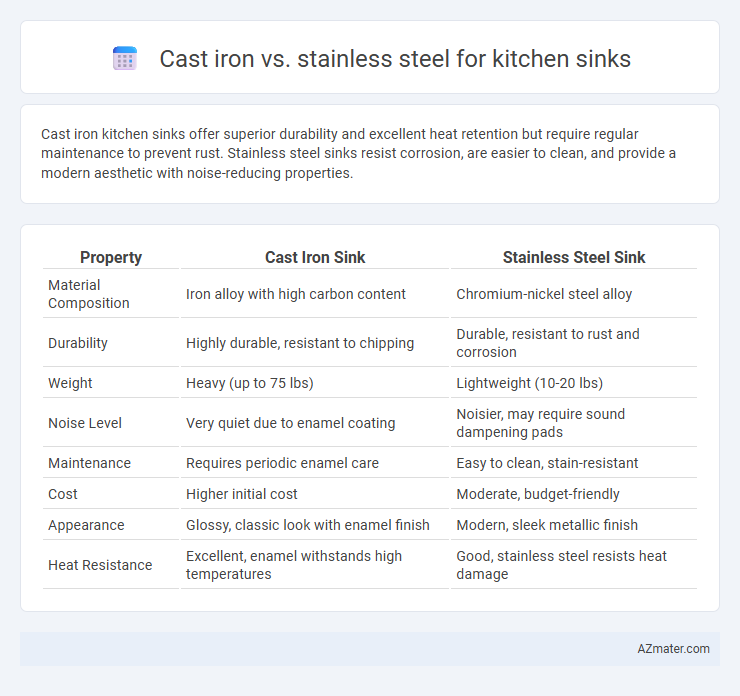Cast iron kitchen sinks offer superior durability and excellent heat retention but require regular maintenance to prevent rust. Stainless steel sinks resist corrosion, are easier to clean, and provide a modern aesthetic with noise-reducing properties.
Table of Comparison
| Property | Cast Iron Sink | Stainless Steel Sink |
|---|---|---|
| Material Composition | Iron alloy with high carbon content | Chromium-nickel steel alloy |
| Durability | Highly durable, resistant to chipping | Durable, resistant to rust and corrosion |
| Weight | Heavy (up to 75 lbs) | Lightweight (10-20 lbs) |
| Noise Level | Very quiet due to enamel coating | Noisier, may require sound dampening pads |
| Maintenance | Requires periodic enamel care | Easy to clean, stain-resistant |
| Cost | Higher initial cost | Moderate, budget-friendly |
| Appearance | Glossy, classic look with enamel finish | Modern, sleek metallic finish |
| Heat Resistance | Excellent, enamel withstands high temperatures | Good, stainless steel resists heat damage |
Introduction to Kitchen Sink Materials
Cast iron and stainless steel are two popular kitchen sink materials known for durability and functionality. Cast iron sinks feature a thick enamel coating over a heavy iron base, offering excellent resistance to scratches and stains, while stainless steel sinks provide a sleek, corrosion-resistant surface with superior heat tolerance. Choosing between cast iron and stainless steel depends on factors like weight capacity, noise levels, and maintenance preferences in the kitchen environment.
Overview of Cast Iron Sinks
Cast iron sinks are known for their exceptional durability and classic aesthetic, coated with a thick layer of enamel that provides resistance to scratches and stains. Their heavy weight ensures stability, making them less prone to shifting or noise during use. The non-porous enamel surface also offers excellent heat retention, making cast iron sinks a popular choice for long-lasting and visually appealing kitchen installations.
Overview of Stainless Steel Sinks
Stainless steel sinks are popular for their durability, resistance to corrosion, and low maintenance requirements in kitchen environments. They typically feature a chromium content of 18% and nickel content of 8%, providing excellent protection against rust and stains while maintaining a sleek, modern appearance. Compared to cast iron sinks, stainless steel options are lighter, more affordable, and offer greater flexibility in design and installation.
Durability and Longevity Comparison
Cast iron kitchen sinks coated with enamel offer exceptional durability, resisting chipping and cracking under heavy use, and can last over 50 years with proper care. Stainless steel sinks provide strong corrosion resistance, are less prone to rust or staining, and typically have a lifespan ranging from 15 to 30 years depending on gauge thickness and maintenance. While cast iron excels in long-term lifespan and impact resistance, stainless steel is favored for its lightweight nature and easier installation.
Maintenance and Cleaning Needs
Cast iron sinks require regular sealing to prevent chipping and rust, with enamel coatings needing gentle cleaning to avoid damage. Stainless steel sinks offer low maintenance due to their corrosion resistance and durability, allowing for easy removal of stains and water spots with mild cleaners. Both materials benefit from routine wiping, but stainless steel provides greater ease in long-term upkeep and hygiene.
Aesthetic and Design Options
Cast iron kitchen sinks offer a classic, glossy enameled finish available in deep, rich colors that enhance traditional and vintage kitchen designs. Stainless steel sinks provide a sleek, modern look with a variety of brushed or polished finishes that complement contemporary and industrial-style kitchens. Both materials come in numerous shapes and sizes, but stainless steel offers more versatility for custom designs and integrated accessories.
Noise Reduction Properties
Cast iron kitchen sinks excel in noise reduction due to their thick, sound-absorbing enamel coating and dense material, significantly minimizing water and utensil impact sounds. Stainless steel sinks, especially those with lower gauge thickness and sound-deadening pads, produce more noise but can be improved with undercoating treatments. Noise reduction in kitchen sinks is crucial for enhancing kitchen comfort, making cast iron a preferred choice for quieter environments.
Cost and Budget Considerations
Cast iron sinks typically have higher upfront costs due to their heavy construction and enamel coating, making them less budget-friendly compared to stainless steel sinks, which are more affordable and widely available. Stainless steel sinks offer greater cost efficiency, especially for budget-conscious homeowners, due to lower material and installation expenses. When factoring in durability and maintenance, cast iron sinks may incur additional costs over time for repairs or refinishing, whereas stainless steel sinks generally require minimal upkeep, further reducing long-term expenses.
Environmental Impact and Sustainability
Cast iron kitchen sinks offer high durability and longevity, reducing the need for frequent replacements and minimizing environmental waste. Stainless steel sinks are highly recyclable, often composed of a significant percentage of recycled material, which supports circular economy principles and lowers resource extraction. Both materials present sustainable options, with cast iron excelling in lifespan and stainless steel in recyclability and carbon footprint reduction during production.
Which Kitchen Sink Is Right for You?
Cast iron kitchen sinks offer exceptional durability and heat retention, making them ideal for heavy-duty use and classic kitchen styles, while stainless steel sinks provide superior resistance to stains and corrosion, along with a modern look and easier maintenance. Consider cast iron for a quieter sink experience and long-lasting enamel finish, whereas stainless steel excels in affordability and versatility with various thickness options affecting noise and durability. Your choice depends on kitchen style, budget, frequency of use, and desired maintenance level for a functional and aesthetically pleasing sink.

Infographic: Cast iron vs Stainless steel for Kitchen sink
 azmater.com
azmater.com